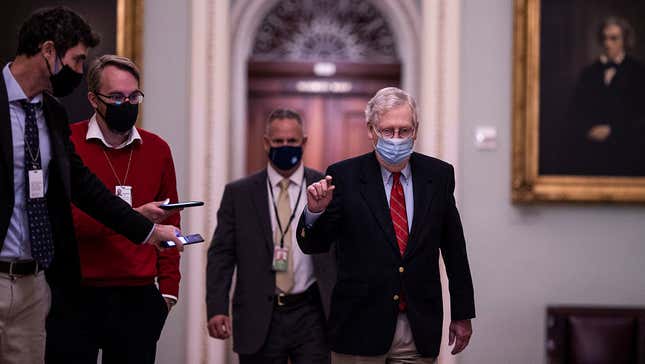
Earlier this month, Republican senator Thom Tillis managed to graft an act that would turn streaming copyrighted material into a felony onto the much-debated omnibus spending bill, which also includes a paltry second covid relief check, among many other things. After even more debate (and many concessions), Congress is poised to pass the bill this evening. The felony streaming rider is still part of it, but it no longer seems to directly threaten Twitch streamers and other content creators.
The text of the $2.3 trillion spending and relief package, which can now be viewed online, includes what Tillis deemed “The Protecting Lawful Streaming Act.” When it comes to illegal streaming for commercial profit, the bill stipulates that individuals who “provide to the public a digital transmission service” that is “primarily” focused on illegal streams will face up to ten years in prison, as well as a fine. This version of law seems to focus on services, rather than, say, individual Twitch streamers or YouTubers who might haplessly air a video clip they don’t own.
“As a general matter, we do not see the need for further criminal penalties for copyright infringement,” wrote Meredith Rose, senior policy counsel of public interest nonprofit Public Knowledge. “However, this bill is narrowly tailored and avoids criminalizing users, who may do nothing more than click on a link, or upload a file. It also does not criminalize streamers who may include unlicensed works as part of their streams.”
“I’d guess that this is intended to prevent businesses from running those streaming sites that just host and run ads against free unauthorized content, like live sports streams, new movies, etc,” video game, esports, and entertainment attorney David “UltraDavid” Graham said on Twitter. “I want copyright reigned in, not expanded, but it’s hard for me to be too mad about that.”
According to Variety, the Motion Picture Association and the Alliance for Creativity and Entertainment have previously gone after operators of sites that distribute copyrighted material, but now they’ll also be able to get the FBI and federal prosecutors involved. This may not directly be a loss for Twitch streamers, YouTubers, and other content creators, but it’s certainly a win for massive companies—one that could have a chilling effect on people’s ability to distribute works that companies don’t want them to distribute.
In response to a Hollywood Reporter article about the felony streaming act, representative Alexandria Ocasio-Cortez had some particularly harsh words.
“This is why Congress needs time to actually read this package before voting on it,” she said on Twitter. “Members of Congress have not read this bill. It’s over 5,000 pages, arrived at 2pm today, and we are told to expect a vote on it in 2 hours. This isn’t governance. It’s hostage-taking.”
Other copyright-related elements of the bill remain controversial. The CASE act will establish a new court-like entity within the U.S. Copyright Office to resolve copyright disputes, which basically means that an unaccountable group of bureaucrats gets to make crucial copyright decisions. They’ll also be able to administer fines of up to $30,000. In a statement published to its website today, nonprofit advocacy group Fight for the Future called the act “atrocious.”
“We’ve seen time and time again that changes to copyright law have profound implications for online freedom of expression and human rights,” wrote Fight for the Future deputy director Evan Greer. “These types of decisions should never be made in closed-door negotiations between politicians and industry or rushed through as part of some must-pass spending package... DMCA abuse and frivolous copyright takedowns are already a huge problem for the next generation of artists and creators, streamers, gamers, and activists. Lawmakers should be working to address these issues and create a fair system that protects human rights and ensures artists are fairly compensated instead of ramming through poorly crafted legislation that could punish ordinary Internet users for engaging in everyday activities like sharing memes and downloading images online.”